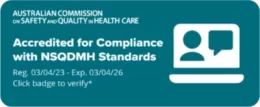Quick Facts
- Around 35,000 people go missing in Australia each year. Many have a mental illness, which can affect someone’s ability to cope and may lead them to go away without telling anyone.
- When someone close to you with a mental illness goes missing, it understandably affects how you feel, think and cope with your worry about their safety and where they are.
-
Common responses when someone goes missing
“The search has been so exhausting, I feel completely drained”
- Don’t be surprised to find yourself crying, having sleepless nights, feeling confused, or losing your appetite. These are all normal reactions to someone going missing.Try to be accepting of yourself and your feelings. Recognise that you’re under a lot of stress, and that getting by day-by-day is a big achievement in itself.
- It’s important to look after yourself during this time. The strain you are under can put you at risk of physical and mental health problems. Ask others for support in day-to-day activities and spend time with your family or friends. Try to eat well, keep up regular routines and some gentle exercise.
“I feel very confused, I’m not sure what’s going on”
- When someone you care about has a mental illness, it is natural for this to affect your relationship. It is common to have complicated feelings such as resentment at the unfairness of the world, guilt, or even a sense of relief that the person may no longer be suffering.
- Anger is also a common reaction when someone with a mental illness goes missing. You may feel angry at the person who is missing or angry at mental health services that were treating them. These are normal reactions, and it is important to have the opportunity to talk about these feelings so you can begin to manage them, especially as you don’t know for how long the person will be missing.
“I can’t cope with not knowing where they are”
- When someone goes missing the response to that shock is often referred to as ‘ambiguous’ or ‘unresolved’ loss – that is, you may be unsure how to feel because you don’t know what has happened. This can be a very upsetting state to be in, which is why it’s important to talk to someone about how you’re feeling so you learn more about living with ‘not knowing’.
“I didn’t really take in their illness, and now they’re gone it’s sinking in”
- When someone with a mental illness is missing, you may feel you are grieving for the person they were before they had a mental illness. Talking about how you felt when your family member was diagnosed with a mental illness and how that affected your life, may help you understand some of the thoughts and feelings that have arisen.
“Others have said that because they had a mental illness, they have probably taken their own life”
- Although some people with mental illness die by suicide, the great majority of those affected do not take their own life.
- Keep a sense of hope that the person will be found. This will help to give you the strength to move forward.
- Rather than feeling that you need to choose whether the person is going to return or stay missing, you might need to think about how to live with the space in between absence and presence – the space of ‘missing’.
“This has hit me hard, I have a mental illness myself”
- If a good friend is missing it can be particularly hard and you may feel that others do not understand your grief. If you are seeing someone about your own mental health, talk to them about it and ask for extra support – you need it just as much as anyone else at this time.
“I feel like I shouldn’t be grieving because they might come back”
- Accepting the disappearance of someone does not mean you have given up hope that they will be found. It is normal to feel a sense of loss when someone is missing, no matter how temporary their disappearance might be.
- It can help to think of the person as a whole, not just a ‘missing person’. Remembering them as they were before they went missing, or before they became unwell, can be an important part of living with the loss.
-
Communication and support
- Friends or family may feel uncomfortable and not know what to say, but it’s important to talk about how you feel. Sometimes a hug and someone to listen can be enough. Give them a copy of the SANE factsheet Is someone close to you bereaved by suicide?
- It’s OK to cry in front of family, friends and even strangers. Tears are an important, physical way to release emotions.
- You may want to talk to a professional counsellor to discuss the emotions you are feeling.
- The demands of looking for someone who is missing can be extreme. Arrange for a group of friends, neighbours, or colleagues to help you with day-to-day activities.
- It can be helpful to talk to people at the mental health service where the person was being treated. Finding out more about what led up to their disappearance could help to bring some understanding as to why they left.
- Talking to people who have been through a similar experience can be a great help. There are missing persons’ organisations in each State that offer support. Contacting carer support groups for friends and family of the mentally ill may also provide valuable support.
- The Internet can be a good way to access information and support, particularly if you feel too upset to see people face-to-face or have difficulty travelling. Use well-established websites such as the ones listed on this Factsheet.
- It is possible that the missing person will attract media attention and you may be contacted. This can be stressful, but remember you are under no obligation to talk to them.
- If you feel that you can’t cope, talk to a health professional such as a GP or someone at your local community health service. Although grief is a normal part of life, sometimes it becomes too difficult to deal with on your own and may trigger other health problems.
- Children may need special support to help them cope after someone close to them goes missing. For more information contact Kids Helpline on 1800 551 800.
- For more information about the process of how a police search is carried out, contact the National Missing Persons Coordination Centre: 1800 000 634.
-
For more information
Other useful SANE Factsheets related this topic are also available from this website:
-
Where to call for help
Lifeline (24-hour crisis telephone counselling)
13 11 14National Missing Persons Coordination Centre
1800 000 634Families and Friends of Missing Persons Unit
1800 227 772Australian Centre for Grief and Bereavement
1800 642 066









